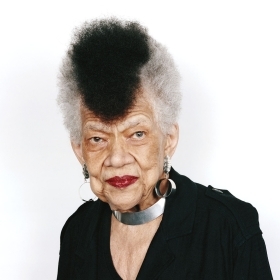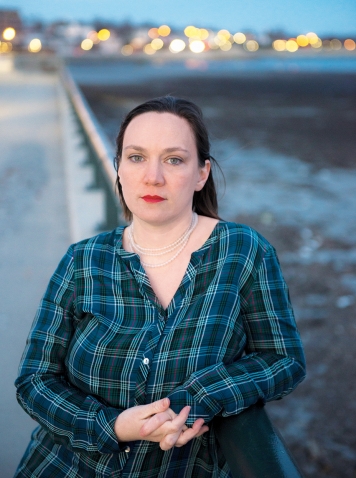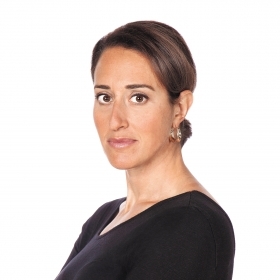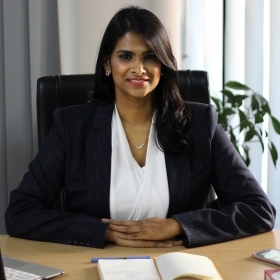Photo by Richard Howard
Stacks of files are piled high on the fading green carpet in the office of Susan Lineberger Roses ’00 in a worn, converted Victorian-style home a block from the ocean in Lynn, Mass. They tell stories of lives touched by rape, murder, and torture.
As an immigration attorney at a small law firm that attracts refugees and asylum seekers, Susan spends her days—and often her nights—counseling those in deportation proceedings before the Boston Immigration Court. She argues their asylum cases, writes appeals, and tries to make sense of the current political climate, which has set off widespread fear in immigrant communities.
“We have so many calls from clients and immigrants who are petrified and want to know what we think might happen to them,” Susan says. “It’s very hard to know what to tell people.”
Susan does her best to focus on individual cases rather than panic over the big picture, but that’s increasingly becoming a challenge, she says. Recently, she lost what she believed was a strong asylum case for a Honduran man who had six family members killed by drug traffickers; he’s been detained since last summer and is awaiting a decision on his appeal. She has to remind herself of the successes. A Guatemalan woman with post-traumatic stress disorder Susan represented can now live and work legally in the United States. “I try to hold onto those moments,” she says.
Her interest in immigration was piqued after graduation, when she took a job as a paralegal at a Boston nonprofit supporting immigrants’ rights. At Wellesley, she majored in Latin American studies and spent a semester in Oaxaca, Mexico. After law school at the University of Connecticut, she landed at the law office of Michael Martel. She’s worked with hundreds of immigrants, primarily from Central and South America. Pro-bono work is a big part of her practice.
Susan sees clients on weekends and pulls all-nighters. That means she has less time to spend with her 7-year-old son. “Working with detained clients is very high-stress,” she says. “The stakes are so high. If you miss details, you can’t just call them up and ask additional questions.”
She recently received a scholarship to represent immigrants through the CARA Family Detention Pro Bono Project at the South Texas Family Detention Center in Dilley, Texas, the country’s largest immigration detention center, 90 minutes north of the Mexican border. It holds as many as 2,400 women and children. “I wanted to see for myself how people are treated at the border,” says Susan.
Women there shared stories with her about their time in holding cells at the border, before their transfer to Dilley. They told her of children being separated from their mothers for days, of trying to sleep in rooms where lights are never turned off, of being fed just once a day, of being denied medical treatment, water, and feminine hygiene products. “Abuses at the border really infect the rest of the process,” Susan says.
Susan was concerned to hear women, including her own clients, talk about errors in their sworn statements taken down by immigration officers after the women were picked up on the border. The government compares information in these statements with asylum applicants’ testimony in court. Any discrepancies could result in deportation.
She’s seen statements from 3-year-olds indicating they came to the U.S. to work (identical to their mothers’ statements, only with the names and dates of birth changed). Her Honduran client’s statement lists a birth town that doesn’t exist, despite what he says he told immigration officers. “So much of this could be fixed by having an independent third-party observer present,” Susan says.
It’s hard to stay positive, says Susan, but she’s encouraged by the increased interest in immigration and activism. “It gives me hope. Even if it’s going to be excruciatingly hard the next few years, this is right where I need to be.”








We ask that those who engage in Wellesley magazine's online community act with honesty, integrity, and respect. (Remember the honor code, alums?) We reserve the right to remove comments by impersonators or comments that are not civil and relevant to the subject at hand. By posting here, you are permitting Wellesley magazine to edit and republish your comment in all media. Please remember that all posts are public.